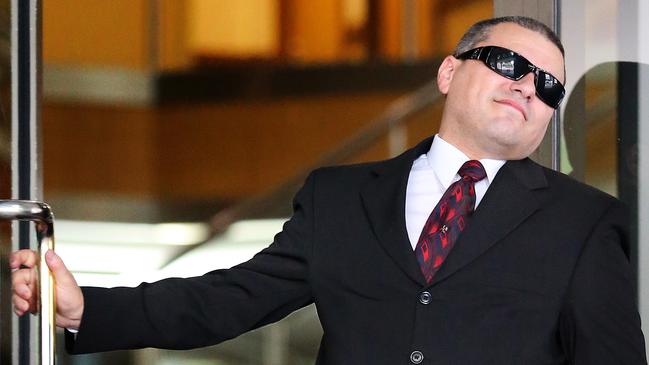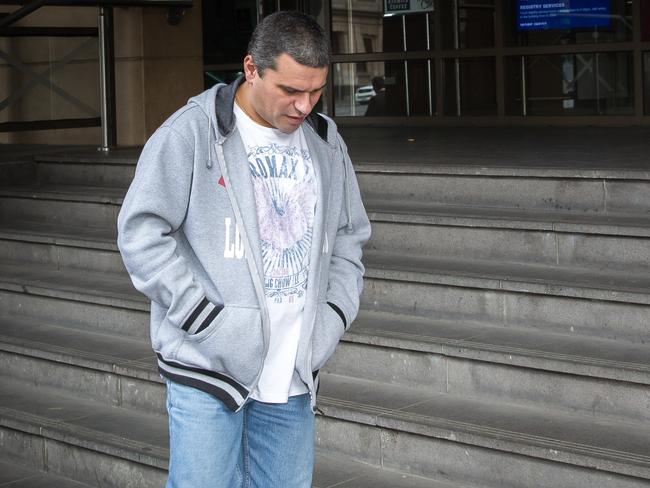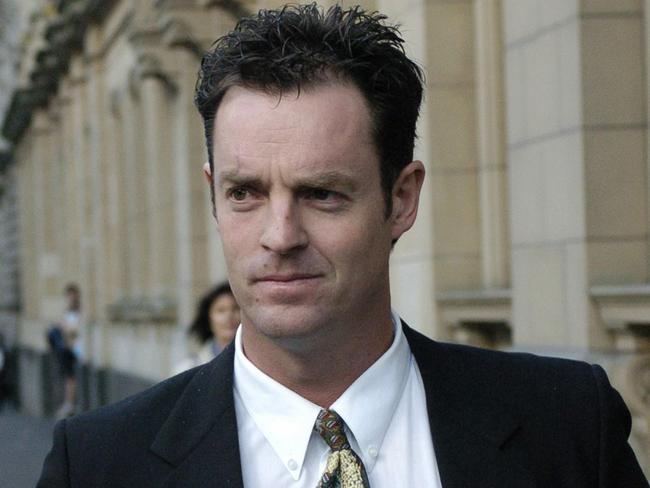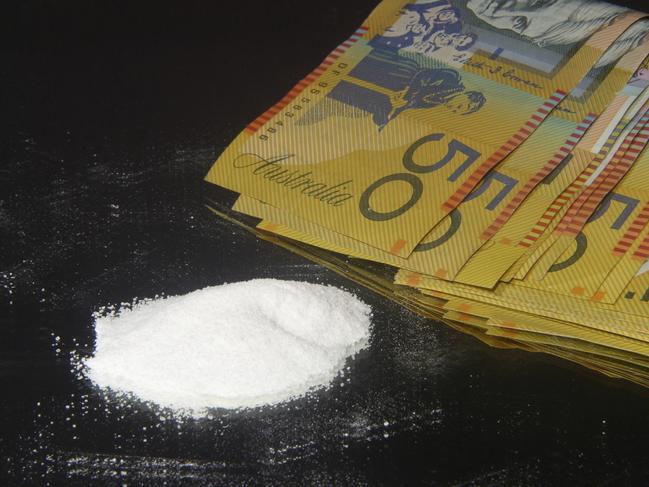Ex cop spills on crooked years in police force with crooked cops
When ice-smoking cop Dave Branov was nabbed he was shown hundreds of telephone intercepts — conversations with his mother and crims — but not one between him and a crooked inspector or senior sergeant. Funny about that.

Andrew Rule
Don't miss out on the headlines from Andrew Rule. Followed categories will be added to My News.
Time and amphetamines have not done Dave Branov’s memory any favours, he admits. But he recalls some details so clearly it might disturb certain people in the police force.
Back when he was running hot to feed his drug habit, Dave would extort heroin from street dealers and take it to the home of a middle-aged man in a middle-class house in the middle eastern suburbs.
The routine was that the other man would call and ask, “You got anything for us?” and Dave would say something like “Hope you’ve got something cold.” He didn’t mean beer.
He’d text from outside the house to say he’d put something in the letterbox. If the householder’s wife was out, he’d be invited in.
The host takes the contraband heroin and hands his visitor a little bag of crystal meth. Then each loads a pipe with his drug of choice.
“I’d be smoking ice and he’d be smoking heroin,” Dave recalls.
They made an unusual pair of addicts.
Dave was a police officer — a dirty cop who worked the streets of Fitzroy, Richmond and Collingwood looking to score free drugs, or sometimes cash, though (he claims) not both.
His host was a police inspector, with enough influence in the force that Dave needed to stay on side.
It couldn’t last. Dave got away with more and more outrageous offences until, finally, internal investigators — then called Ethical Standards — could ignore it no more.

And that is the story of how David Branov, former computer software engineer, drug user and friend of outlaw motorcycle gang members, crashed and burned eight years after joining the police as a mature recruit at 35.
In 2013, his arrest, bail breaches and subsequent trial made headlines because he was seen as a Hells Angel “plant”. The odd thing, he says, is that only one other policeman, gambling addict Brendan Nolan, went down with him.
Nolan was greedy, Branov says, in that he took not only dealers’ drugs but cash, too. To take one or the other was, in bent cop speak, “taxing” them. To pocket both money and drugs and charge them as well was to “rob” them, and invited trouble.
Branov was sentenced to four years and released in 2017. At first, he was in the secure Hoya protection unit at Barwon, later in a special section in the Ararat prison, where everyone outside their unit was a sexual deviate.
There, Branov spent time talking quietly to another “Dave” in disgrace: David Miechel, rogue drug squad detective and co-offender in the Oakleigh drug house scandal in 2003 alongside doomed police informer Terry Hodson.
Miechel, later released after 12 years, has remained tight-lipped about whether he knows anything about the deaths of Hodson and his wife, which prevented them testifying about police sergeant Paul Dale’s part in the Oakleigh break-in.
But Branov has decided to break ranks about the silent and almost invisible undertow of corrupt influences that allowed him and others to get away with too much for too long.
He could — but won’t — name names, not just of the former inspector but of a senior sergeant who routinely rifled police property stores, and of a detective who showed him how to swear falsely to information from non-existent “informers” to obtain search warrants, sometimes used to “find” planted evidence.

This week, Branov started talking to crime reporters about the self-inflicted wrecking of his life. Four years after quitting prison, he is eking out a quiet life in a western suburb.
He grew up in Thomastown, raised mostly by hardworking Macedonian grandparents after his parents split when he was four. He was good at maths, electronics and organic chemistry. He studied computer science and became a hotshot troubleshooter for the Ericsson telecommunications company in Broadmeadows.
But even before he started that job, he used his chemistry knowledge to dabble in “cooking” amphetamines. At work, he started using “uppers” to keep him awake for long shifts, sometimes overnight, to fix telephone blackouts.
By the time Ericsson sold out and retrenched local staff around 2004, he had a habit. He spent a year getting fit, quit using “speed” and joined the police force.
In theory, Branov seemed the sort of educated, mature recruit the force needed.
In practice, he says that growing up in Thomastown meant he knew some hard cases who later joined outlaw motorcycle gangs. He was friendly with an older Hells Angel he called “Dad” and kept up the friendship after joining the force.
By recruiting him, the force put a fox in the henhouse. He wasn’t the only one. He sniffed out others with interests in illicit drugs and cash.
It was clear, in inner-suburban stations, bent police pilfered the property rooms where seized goods and drugs were stored.
“It was like K-mart on Saturday,” Branov says.
Two cops, keen shooters, took a keen interest in seized firearms. Another, a sergeant, stole seized cigarettes but worked his way up to laptops, fishing rods and tools to sell for cash because his son was a heroin addict and needed extra money.

They could get away with taking goods and drugs from the property office if the offenders responsible had pleaded guilty. Goods could be written off as claimed by rightful owners — and drugs destined to be destroyed were swapped for harmless substitutes: crushed Panadol for heroin, kitty litter crystals for “ice”.
Branov recognised a fellow addict when he saw the inspector one night on a street operation with his eyes “pinned”, the giveaway of every junkie. He dropped a hint and got the nod.
The inspector had ways to get many illicit drugs but liked smoking heroin, a habit picked up while living with a prostitute between marriages.
The result, he says, is that they ran “swap meets” to exchange drugs, often every two weeks. It had to end badly — for one of them.
The inspector used heroin cagily. He smoked it, never injected. But Branov’s growing dependence on “ice” sucked him deeper and deeper into a world that would destroy him.
He was being paid by a crook who ran an apparently legitimate engineering workshop near Footscray. The beauty of the workshop was that if they used steel tubes, pans and bottles instead of glassware to make “speed”, it blended into the background. Even the smell of methamphetamine was masked by industrial smells of oils, solvents and fuel.
But drug dealers who use drugs tend not to last.
Branov and his greedy sidekick, Nolan, were tipped off via Nolan’s ex-girlfriend, a police clerk, after an ESD investigator told her their “phones were off”.
If Branov had quit then, gone back to computers and away from the street, it might have been different. Once the internal investigators were watching, it was crazy to keep going. But they did.
When the axe fell he was interviewed and shown hundreds of telephone intercepts. He was amazed. Every conversation with his mother was there, and those with crooks. But not one between him and the bent inspector or senior sergeant at his home station.
“Funny about that,” he says drily.
“When I asked them how far they wanted to go with it all, they said: ‘How many careers do you want to f*** up?’”
None except his own, as it turned out. The first rule of cop corruption club is that there is no corruption club.
The heroin-using inspector is still in the force, he says.





